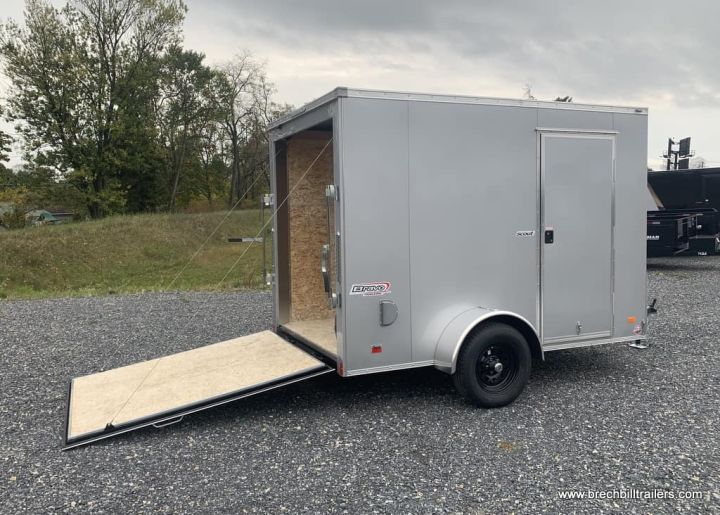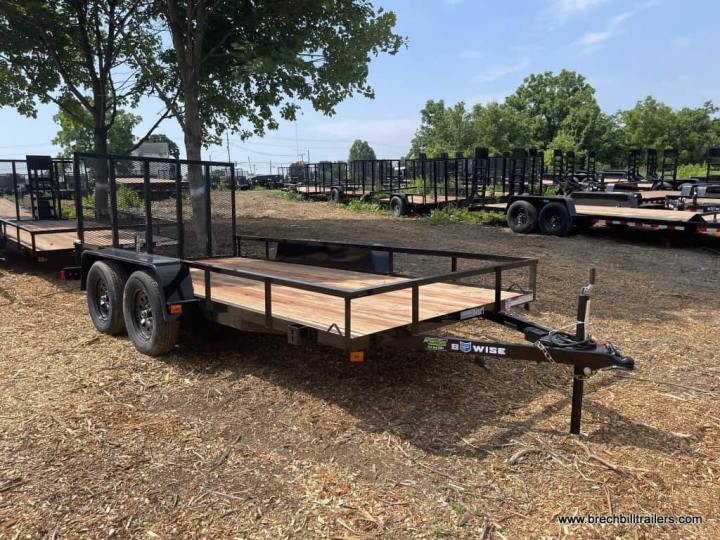
If you’re moving, renting a trailer can be a really great option. But if you know you’d find a trailer useful in the future, you might be thinking about buying one.
But there are lots of options out there, and how can you know which will work best for you? In this article, I’ll walk you through your different options.
Moving Household Goods
If you’re moving your household, probably the bulk of what you need to transport will be boxes and furniture. The trailer types that will work best for you are utility trailers and enclosed trailers (also called cargo trailers).
Utility Trailers
A utility trailer is built without side walls or a roof. It’s primarily a flat surface on wheels, which makes it the most affordable option. However, don’t underestimate utility trailers—they’re made to make your hauling easy. For example, they have side rails all around the flat bed. This makes it so that large objects won’t slide off your trailer. But, more importantly, the side rail functions as a place to attach ratchet straps and other tie-downs, so that you can secure your load.
There’s a range of options you can find in utility trailers. For example, “D-rings” mounted to the bed are another great place to attach straps, and they’re particularly helpful if your load doesn’t extend as high as the side rail. Some trailers also have solid or mesh side walls, so that small items like tools won’t slide off while you’re driving.
A utility trailer also generally has a rear ramp for easier loading and unloading. Some models may even have a side ramp as well.
Furthermore, utility trailers will generally weigh less in proportion to their GVWR. That can mean that you can haul more weight, though you’ll need to check the rating on your trailer and your towing vehicle.
So a utility trailer is a great basic option. If you can pick your moving times based on weather conditions, an open trailer will be just fine for most situations. If you’re worried about rain damage, you can even throw a tarp over whatever you’re moving.
Enclosed Trailers
The most convenient option for moving is definitely an enclosed trailer, also called a cargo trailer. They’re called “enclosed,” because they have a roof and side walls, and all your cargo will be protected from the weather. Typically, they’re tall enough so that you can stand up inside, which makes loading easier.
Of course, this makes an enclosed trailer more expensive, but it may be worth it for you. The benefit of an enclosed trailer is that it keeps your stuff safe from the weather—and even from theft, if you lock the trailer.
Also, not everything in your trailer will need to be boxed up. Something like a lamp, for example, won’t fit easily into a box. No problem. You can just set it in the trailer someplace where it won’t roll or be crushed by falling boxes, and you don’t need to worry about it until you’re unloading.
There’s also less strapping needed for an enclosed trailer. Nothing is going to fall off while you’re driving. Trust me, you don’t want to have to re-tie your mattress halfway there, when it’s slipping off the back of your trailer.
However, you do need to make sure your load is secure enough not to fall or shift inside the trailer. Falling furniture or boxes can damage whatever is in its path, besides risking overturning your trailer. And not all enclosed trailers have easy places to attach just any kind of straps, so just be sure that you have the options you need and the straps you need.
Enclosed Trailer Doors
If you’re buying an enclosed trailer, make sure you get the doors that you need. Some enclosed trailers come with doors that swing open, and some come with a ramp instead. Having a trailer with a ramp door will make it easier to walk up into your trailer or to roll a cart into it. However, the swinging “barn door” style will make it easier to pull close to the unloading area. You’ll be able to back right up to your porch or wherever you’re unloading.
Many enclosed trailers also have a side door. This can be really helpful if your trailer has a ramp door in the back. That way you can get in and out of the trailer in order to check on your cargo, without needing to open the ramp every time.
Storage Space
With an enclosed trailer, you also don’t need to unload your cargo right away. Inside the trailer, it will be safe from the weather (unless your cargo needs to be temperature-controlled).
You can also use an enclosed trailer for storing things long-term, although that won’t be convenient if you plan to use your trailer frequently.
Moving Small Equipment
You might also be moving a piece of small equipment, like a mower or a tractor. In that case, an enclosed trailer is probably more than you need. Utility trailers are perfect for this, since they have ramps and lots of places to attach tie-downs.
However, an enclosed trailer is definitely more weather-proof than a utility trailer. And, of course, you could use it long-term to store your equipment inside.
This should go without saying, but if you do get an enclosed trailer for your small equipment, be sure you get a trailer with a ramp. And be sure the ramp is rated for the weight of your equipment.
Consider Quality
Finally, be sure you’re aware of the quality of the trailer you’re buying. Some brands make their trailers cheap by building them like cracker boxes on wheels, but there are also brands that build tough trailers that will last. Here are some ways of checking the quality of your trailer.
Utility Trailers
For utility trailers, check if the tongue, where the trailer hitches to your vehicle, is built of C-channel (shaped like a C with square corners) rather than just angle iron (shaped like an L). C-channel, since it has three sides instead of just two, will be significantly stronger than angle iron. Also, look at the thickness of the metal.
Something you might not think to look for is whether the corners of the C-channel or angle iron are sharp corners. This means that it’s full-dimension forged steel, which is stronger than stamped metal plate.
Some other seemingly small details can also improve durability. For example, larger wheels will tend to be more durable, since they won’t need to spin as many times to travel the same distance. LED taillights are brighter, will probably more trouble-free than incandescent ones, and they’ll last longer.
Check out the ramps. How much weight do they look like they can handle? Note the ease of removing the ramps, in case you might want to. Also, check how easy the ramps are to open and close. Spring-assisted ramps and ramps that are split into two will be easier on your back when you’re lifting them.
Enclosed Trailers
For enclosed trailers, check whether the trailer has an undercoated frame, which will keep corrosion from salt and road spray from shortening the life of your trailer. Check whether the sidewall posts are true tubing or whether they are just stamped metal. Is any plywood inside merely 3/16” thin, or thicker, such as 3/8”?
Also, don’t forget the roof. Is it one piece? If there are seams in a metal roof, it may leak eventually. What’s it made of? Aluminum will resist corrosion much longer than galvanized steel.
As mentioned earlier, if the trailer has a ramp door, what weight is the ramp rated for? Can you drive your tractor up it, or is it only for walking?
Quality matters. Always examine the workmanship of any trailer—do the welds look neat and strong? Do the joints fit tight and smooth or does it look patched together? Visible attention to detail or lack of it by the manufacturer and workers shows what they put into the parts you don’t readily notice. A good quality trailer is worth the investment because it will last you for years to come.
We hope you found this blog post on Moving? Here’s Your Trailer Buying Guide, useful. Be sure to check out our post on Buying Guide: Different Types of Semi Trucks Explained for more great tips!
Have Experience in the Moving Industry? Want an Additional Income Stream? Work With All Around Moving!
Our unique Work With Us program gives the opportunity to experienced moving consultants to run their own Moving Consultant business from anywhere in the United States. Click here to learn more.






